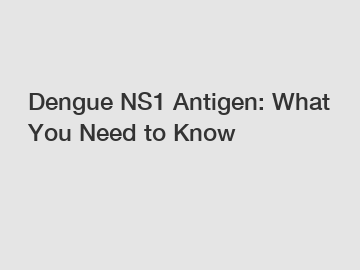Dengue NS1 Antigen: What You Need to Know
Dengue fever is a tropical disease caused by the dengue virus, which is spread through the bite of infected Aedes mosquitoes. This illness affects millions of people worldwide each year, with symptoms ranging from mild fever and body aches to severe complications like dengue hemorrhagic fever and dengue shock syndrome. One important tool used in the diagnosis of dengue fever is the NS1 antigen test.
The NS1 antigen is a protein produced by the dengue virus early in the course of infection, even before the patient develops antibodies. This makes it a valuable marker for early diagnosis of the disease, as the test can detect the presence of the virus within the first few days of symptoms appearing. Detecting the NS1 antigen in a patient's blood can help healthcare providers quickly diagnose dengue fever and start appropriate treatment.
The NS1 antigen test is a rapid diagnostic test that is performed using a small sample of the patient's blood. The test can be done in a clinic or hospital setting and provides results within 15-20 minutes. This quick turnaround time is crucial in the diagnosis and management of dengue fever, as early detection can lead to better outcomes for patients.

In addition to its role in diagnosing dengue fever, the NS1 antigen test can also help differentiate between dengue and other similar illnesses, such as Zika virus and chikungunya. This is important because the treatment and management of these diseases can vary, so an accurate diagnosis is essential for providing the best care for patients.
When interpreting the results of the NS1 antigen test, it is important to consider the timing of the test in relation to the onset of symptoms. The sensitivity of the test is highest in the first few days of illness when the virus is actively replicating in the body. As the infection progresses, the levels of NS1 antigen may decrease, making it more difficult to detect with the test.
It is also important to note that the NS1 antigen test is not 100% accurate and should be used in conjunction with other clinical and laboratory findings to confirm a diagnosis of dengue fever. False positive and false negative results can occur, so healthcare providers should consider the patient's symptoms, medical history, and other test results when making a diagnosis.
Overall, the NS1 antigen test plays a crucial role in the diagnosis and management of dengue fever. Its ability to detect the virus early in the course of infection allows for prompt treatment and monitoring of patients, which can improve outcomes and reduce the risk of complications. Healthcare providers should be aware of the benefits and limitations of the NS1 antigen test when evaluating patients with suspected dengue fever.
In conclusion, the NS1 antigen test is a valuable tool in the diagnosis of dengue fever. Its ability to detect the virus early in the course of infection can help healthcare providers make timely and accurate diagnoses, leading to better outcomes for patients. Understanding the role of the NS1 antigen test in the diagnosis and management of dengue fever is essential for healthcare providers who care for patients at risk for this potentially serious illness.
If you are looking for more details, kindly visit hiv 1 2 test, Alcohol Saliva Rapid Test Strip, dengue ns1 antigen.



